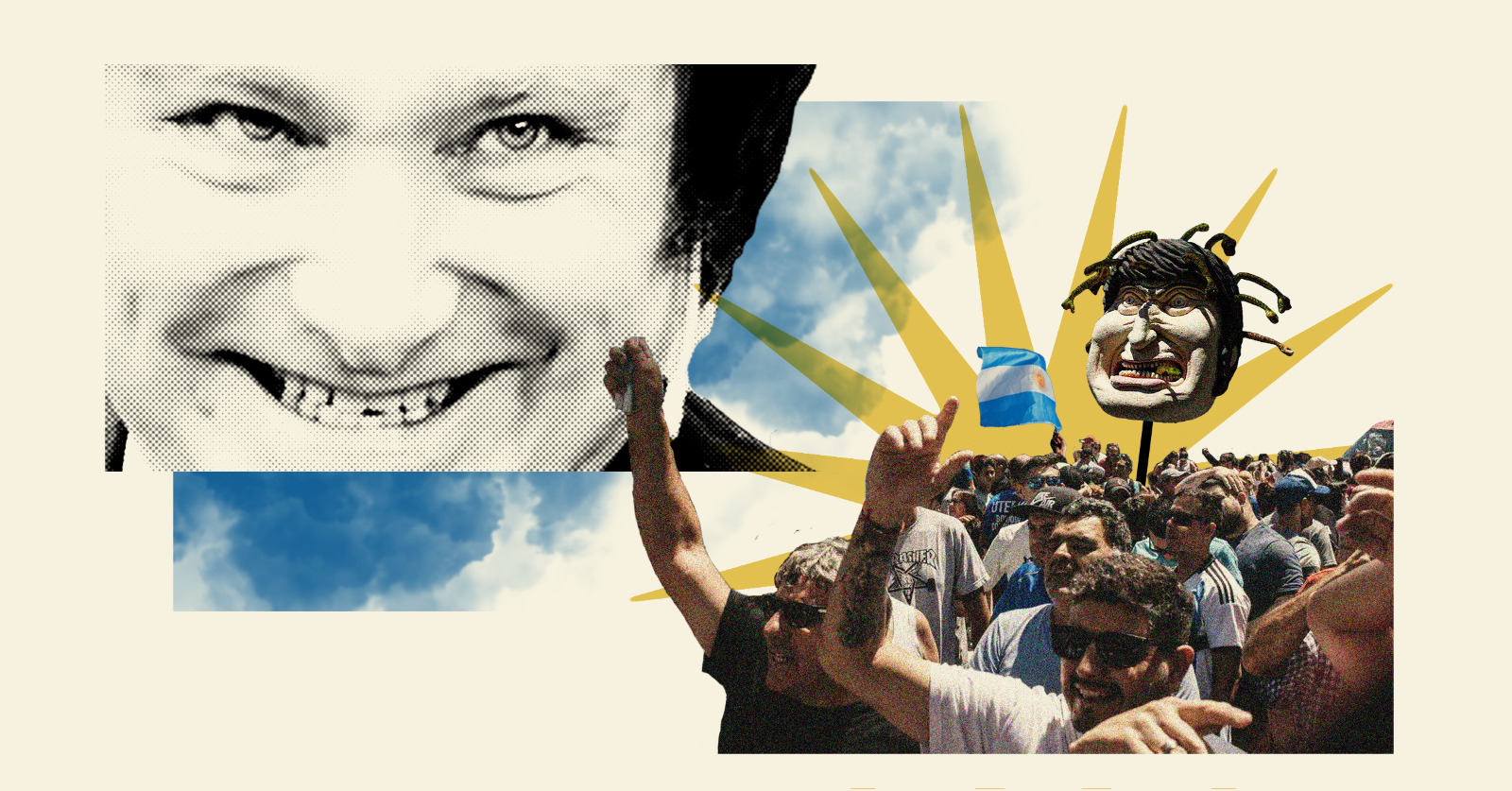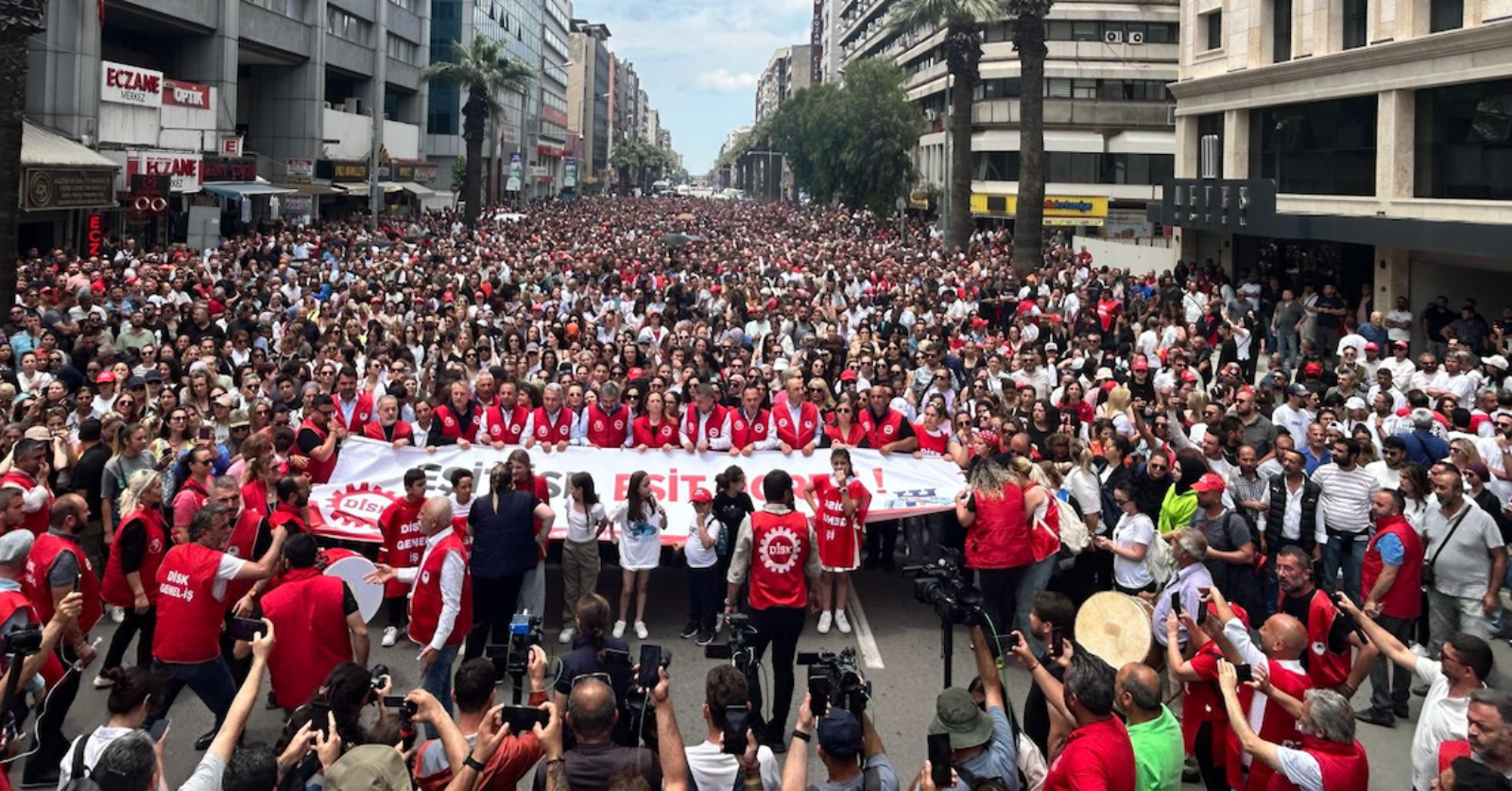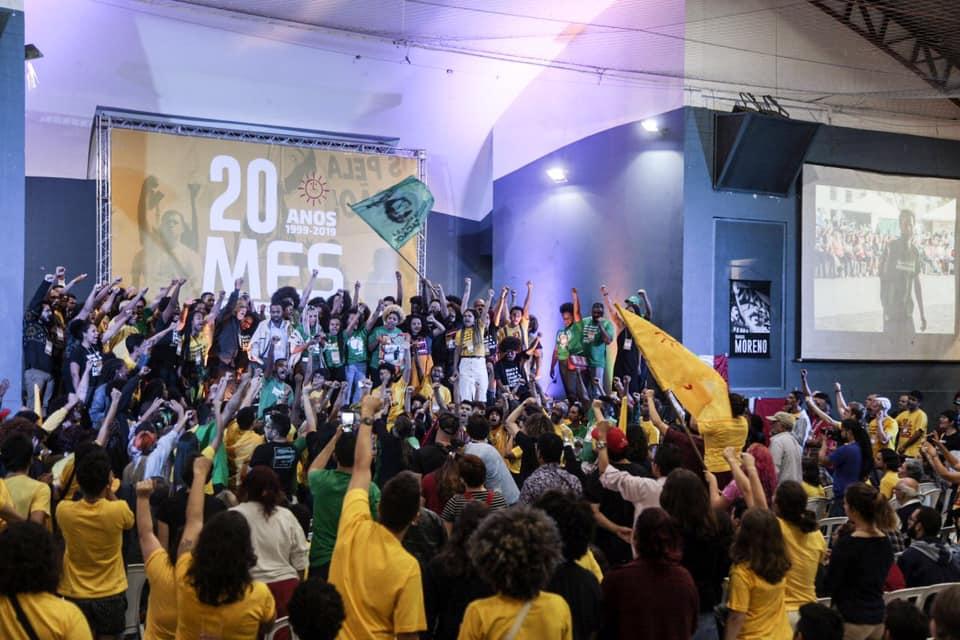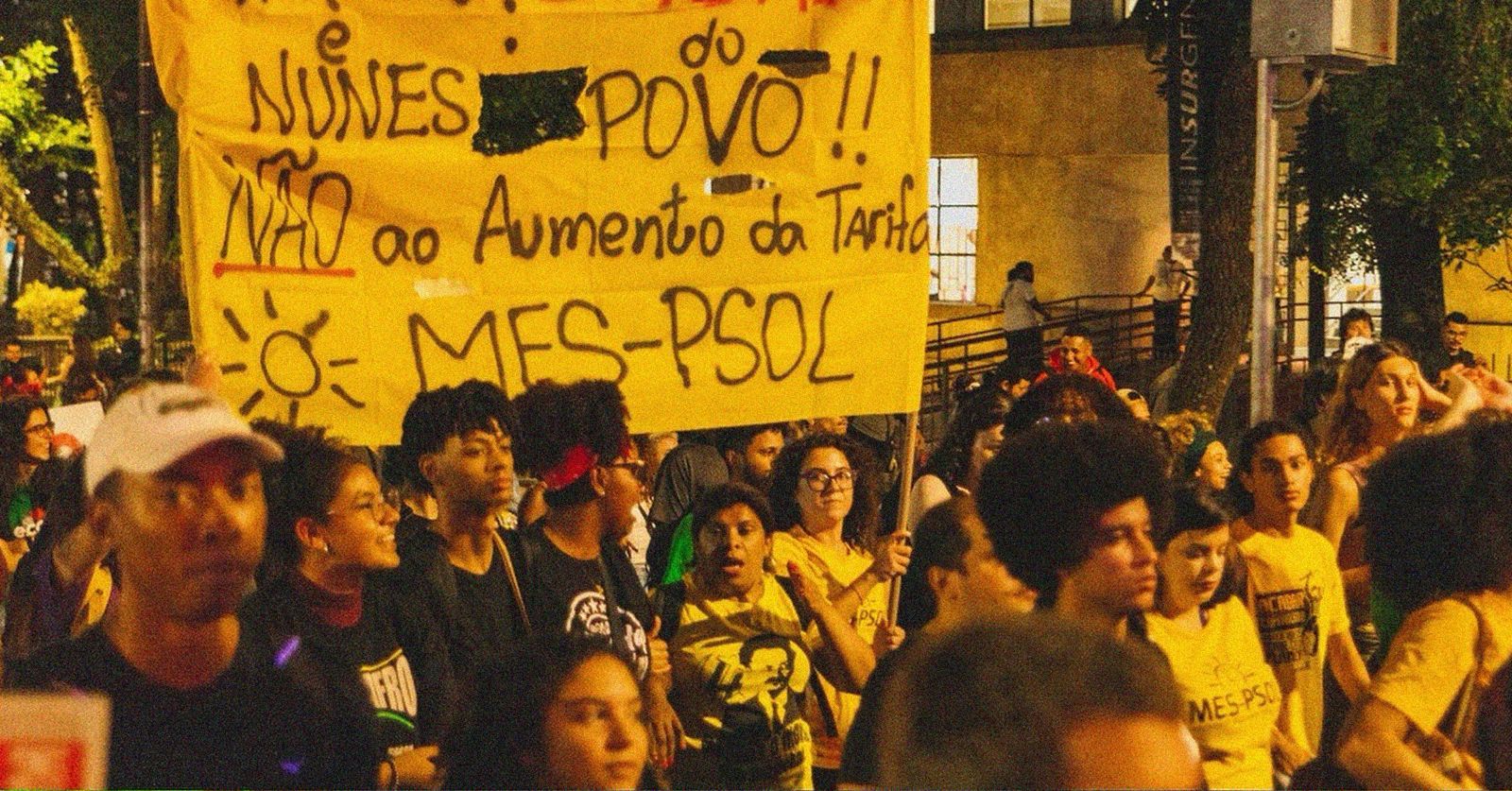We republish below a short account of the general strike in Argentina on January 24, 2024 by Oscar Martínez (a member of the Taller Estudios Laborales in Buenos Aires) and excerpts from a longer interview on the political conditions in Argentina that was done with Claudio Katz (an economist and professor at the University of Buenos Aires and a member of Economistas de Izquierda). Together they give a good impression of the catalyst for and state of popular organizing underway in Argentina as the people there respond to newly-installed President Javier Milei’s far-right agenda.
“The Labor Movement, Once Again,” by Oscar Martínez
Once again the workers’ movement took the path of resistance and struggle, and also that of unity, at least in relative terms.
The workers’ movement, not only the trade union movement — because the march and the mobilization was of employed and unemployed workers, formal and precarious, of production, services, education, health, culture, retirees, social movements, human rights movements, neighbors, consumers. It concentrated all the anger and all the rejection of the new government and its fiercely anti-popular measures.
This is a government that, as we see in much of the world, is trying to implement measures that will relaunch the offensive of capital on the workers and the people. It threatens much more than the loss of specific rights or wage levels, it is a blow against all workers’ rights, redesigning the country and concentrating even more — almost absolutely — power and wealth in a few hands. The hands of the real caste.
The CGT union federation felt somewhat uncomfortable because the call went beyond the sectors it wanted to call, as well as the slogans and the measures it demanded. It was intended to be only a mobilization of the unions against the labor reform, but it became a sounding board for many other sectors and for other claims and demands.
The slogans, given the size of the crowd, were very varied, but two stood out among them all: “The homeland is not for sale!” and “Unity of the workers, and whoever does not like it will get screwed” (“La patria no se vende” and “Unidad de los trabajadores, y al que no le guste se jode”).
The government tried, as it has so many other times, to prevent the access of columns of workers from the suburbs to the city of Buenos Aires, but it was another failure for the ruling classes and their pathetic officials. The banners of workers from Lomas de Zamora, Castelar, Cañuelas, Tigre and so many other places were seen along Avenida de Mayo and in the Plaza del Congreso. Our dreams are their nightmares.
What was seen in the Plaza del Congreso was replicated in a good part of the country. The mobilization in Rosario was immense, one of the largest in recent decades.
This general strike and rally showed, once again, what the ruling sectors fear so much: the possibility that the different sectors of the working class unite, that they occupy the streets against them and that they confront their policies of destruction of rights and the selling out of the country. It is very clear that today [January 24th] was not enough, and that is why many sectors demanded guidelines on how to continue. It was not the final championship, it was only one match. But in this one, the workers’ movement won by a landslide.
Republished from Tiempo Argentina
“The Coin Is in the Air and the One Who Shows the Greatest Determination Will Win,” excerpts from an interview with Claudio Katz
In November and December you wrote that the Milei project hinged on popular resistance. What is your evaluation of the CGT strike and mobilization?
They had an extraordinary reach both for their massiveness and for their political impact. The square and its surroundings were filled with a spontaneous crowd, which complemented the union presence. It was a shocking protest 45 days into the new government, in the middle of holidays and in very hot weather. The march was organized with regional plenaries and had great participation from youth, neighborhood and cultural sectors. We can see once again that when the organized workers’ movement intervenes, its power is overwhelming; it has been the protagonist of the main popular battles.
The mobilization also had a great international effect…
Certainly. Acts of solidarity were recorded in front of embassies in many European countries and in the main capitals of Latin America. There it was demonstrated that an incipient global consciousness against the extreme right is emerging. It is beginning to be noticed that, if Milei wins, Kast [José Antonio Kast, a leader of the right wing in Chile], Bolsonaro, Uribe [Álvaro Uribe, a leader of the right wing in Colombia], and Corina Machado [a leader of the right wing in Venezuela] are strengthened in our region and Trump, Le Pen, and Abascal [Santiago Abascal, leader of the far right party Vox in Spain] in the first world.
If, on the contrary, we manage to stop Milei, the global wave of reactionaries will face its first defeat in the streets against an organized resistance. While the anarcho-capitalist [Milei] seeks international support from the International Monetary Fund (IMF), the bankers, and the big capitalists, the struggle of the Argentine workers awakens solidarity from below, in many corners of the planet. That fracture line is very promising…
Is [Milei’s hostility to China] just submission to the United States or a new general strategy of the far right…
Both. Milei has great affinity with Netanyahu, because they are the two central characters of the new international turn of the far right. With their atrocious practices, they promote a passage from speech to facts.
The massacre in Gaza that Netanyahu commands and the destruction of the Argentine economy that Milei promotes, differ from the conventional management that Bolsonaro or the first Trump had and that Orban and Meloni maintain. The two reactionary characters of the current moment sponsor drastic actions of geopolitical reordering, following the imperial counteroffensive launched by the United States to recover positions in the world.
In the Middle East, this hardening implies creating a fire, to block China’s relationship with Saudi Arabia and the consequent progress in the de-dollarization of the world economy. In Latin America, it means resuming the conservative restoration with greater virulence, to suffocate the fragile dawn of a new progressive cycle. Milei is a piece of the strategy conceived by Trump for a new mandate from the White House.
Does this line of action bring Milei closer to fascism?
It is not the appropriate term to characterize his project. Milei seeks to introduce labor reform in Argentina to make employment precarious and consolidate a neoliberal model similar to that developed in Chile, Peru, or Colombia. To achieve this objective, he needs to modify the relations of forces by subduing unions, social movements, and democratic organizations. It is a Thatcherite objective, focused on breaking the country’s powerful popular organizations. It seeks to settle emblematic social conflict in favor of the dominant classes, as occurred with the English miners’ strike in 1984.
Milei is surrounded by fascist groups, but his project is not fascist. It is not on their immediate horizon to forge a tyrannical regime, with the deployment of terror against popular organizations. This reactionary model usually appears in situations of revolutionary danger. For the moment, the libertarian intends to subdue the workers with the support of the ruling class and the media.
The powerful forgive him everything so that he can make his adjustment possible. They say nothing about the nonsense of a president who spends public money remodeling his residence to accommodate his dogs, who wastes time in delirious debates on social networks with fake accounts, or who prosecutes the driver who ran over a dog.
The owners of Argentina look the other way, hoping that their war plan against the people will work. There is a lot of business at stake at the expense of the masses. The demolition of pensions and the auction of the Guarantee Fund reopen, for example, the possibility of reintroducing the AFJP [pension] scam. The restoration of the income tax for higher-income earners finances money laundering and the new forgiveness of major tax evaders.
But doesn’t his erratic and unpredictable management generate opposition?
Yes. Every day he breaks out with some improvisation, because he reacts chaotically to the failures he faces. He was greatly affected by the success of the strike and with his usual fury, he removed officials and fired ministers. His big bet is the regressive remodeling of the country, through the Decree of Necessity and Urgency and the Omnibus law. They are two unconstitutional initiatives to perpetrate a gigantic looting.
But he faces the same limit which in 2019 forced Bolsonaro to negotiate his measures with many legislators or governors, granting advantages in exchange for votes. In these negotiations, Milei has already had half of his program cut. It would be approved in general, but the specific initiatives would be completely cut. He has the support of the PRO, the UCR, and the Hacemos Coalición Federal [three political parties in Argentina] to attack popular rights, but that support does not extend to business management. One thing is the common goal of destroying unions and social movements and quite another is who gets to keep the profits from privatizations and deregulation.
The companies that compete for that cake have different spokespersons in Congress. That is why the conventional right tries to limit the powers delegated to the executive. It gives him carte blanche to repress social protest, but intends to keep a portion of the ongoing tax remodeling. The libertarian is not able to put these disputes on track in parliament and his political authority is liquefied, in the endless round of negotiations with the friendly right wing. If he manages to reach an agreement in Congress, he will still have to go through the shredder of the Senate, when the courts are already issuing rulings limiting his action.
What will Milei do if these obstructions persist?
Everything indicates that he is evaluating a plebiscitary adventure. It could be now or later. He studies this call to the polls, with the excuse that Congress does not let him govern. In this way he would resume the campaign against the “caste” on which he based his electoral success. He imagines this measure as the kick-off for the authoritarian political regime that he longs to build. The electoral reform — which Congress has already rejected — supported this model, defunding electoral activity and privatizing politics, through the fragmentation of the electoral map into numerous constituencies.
Milei’s big problem is the absence of his own political base. There lies the big difference between Milei and Bolsonaro, Trump, or Kast. He does not have that support and until now he has not been able to forge it. He did not manage to create a reactionary movement against the strike, nor repeat the right-wing marches of the Macri era [Mauricio Macri, former president of Argentina, 2015-2019] or the regressive protests of the pandemic against progressivism.
He also has in mind the repressive option… with multimillion-dollar fines for unions, limits on the right to assembly and provocations against protesters. The presence of the gendarmerie in the streets increases and Milei looks for some pretext to authorize the intervention of the armed forces in internal security. With that objective, he purged the high command and placed a man very connected to the Pentagon in its command. But he has not achieved results in this field either.
The great test is the protocol against pickets, to prevent demonstrations, which until now has been exceeded time and time again. The incident where police randomly arrested protesters at the door of Congress confirms that failure. In this area the dispute will continue with active and brave popular protest.
Won’t what happens in the economy be equally decisive?
Definitely. Milei intends to lower salaries and impoverish the majority, to stabilize the currency by lowering inflation through an induced recession. With the reduction in public spending, the contraction of domestic consumption, and the collapse in the level of activity, he hopes to flatten inflation. It’s happened several times in the past.
This is the orthodox adjustment underway, which tends to generate a drop in GDP greater than that observed last year. Milei is betting on the exchange rate front with the arrival of dollars from the record harvest, hydrocarbon exports, and the decline in imports. His objective is to recreate — with the approval of the IMF — a scenario similar to that prevailing in the 90s with Menem. In that framework he would forge his right-wing political base…
What then are the developing scenarios?
The alternatives depend on the result of the aggression against the people. All of Milei’s precursors managed to impose their agenda for a certain period, without ever achieving the neoliberal remodeling of the economy and without achieving the stabilization of a right-wing government. The difference between Videla, Menem, and Macri lay in the period in which they managed to preserve their models.
The last experience [Macri’s] was the shortest and that brevity could be repeated, if the ongoing popular battle achieves a success similar to that achieved against the 2017 pension reform. Milei hopes to avoid that frustration by upping the ante with the dollarization card and the power blocs are closely following his administration, evaluating whether to continue supporting him or to prepare a replacement with the Villaroel-Macri tandem. Everything will depend on the outcome of the social battle being waged in the streets, and what happens with the omnibus law will provide a first indication of this confrontation.
Do you notice changes in popular resistance?
The massiveness and diversity in the CGT [labor federation] event indicate that there is a certain awareness of the intensity of the ongoing struggle. Many attendees at that protest remarked that “this is just beginning” and others called to continue in the streets again and again until Milei is defeated. In some neighborhoods the assemblies and las cacerolas [popular protests where people bang pots and pans] reappeared with some reminiscence of 2001 and a key fact was the closing of the event with the speech of a Mother of the Plaza de Mayo [human rights activists who fought against the kidnappings of the Argentine dictatorship in the 1970s]. This centrality of human rights will be decisive in the current battle.
I also find the openness of the CGT leadership striking, which met with FIT deputies [politicians of the Workers’ Left Front, a socialist electoral alliance in Argentina] and invited the bulk of the event’s organizers to the stage. They do not want to repeat the rejection of their past complicities, their inaction in the Macri era, or their blindness to the emergence of social movements.
In any case, the follow-up for a plan of struggle is still pending, because it is evident that a strike is not enough to stop Milei. In the marches they chant over and over again in favor of the unity of the workers against those disgusted with what’s happening. This slogan expresses a deep desire to redouble the struggle, with the union organization at the head of a front to defeat Milei’s adjustment.
The radicalization that is beginning to be noticed also seems significant to me, among the sectors that hope to win the streets until the government falls. The filmmaker [Adolfo] Aristarain stated it explicitly. Finally, I would pay attention to the meaning of the slogan “the homeland is not for sale,” which was taken up by many participants in the march… It is a way of questioning neoliberalism, highlighting that “I am not selling myself” because “I am not a commodity.” The underlying meaning is a variety of progressive patriotism.
In short, it seems that we are returning to the typical crises and dizzying outcomes of Argentina….
Yes. Everything accelerates again and begins to settle in the middle of summer [in Argentina]. The initial impression of a truce until March-April has faded, because the audacity with which Milei acts is clear. It is his central feature and the rest is secondary. Whether he improvises or whether he has a plan is an accessory fact, compared to a determined reactionary behavior very similar to Thatcher, Fujimori or Yeltsin. The oppressors support this position and in the popular field we must respond with the same resolution. The coin is in the air and the one who shows the greatest determination will win.
Republished from Indymedia Argentina




